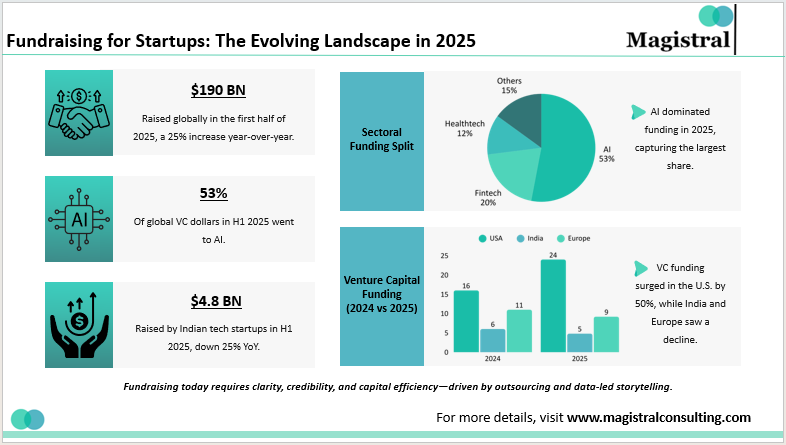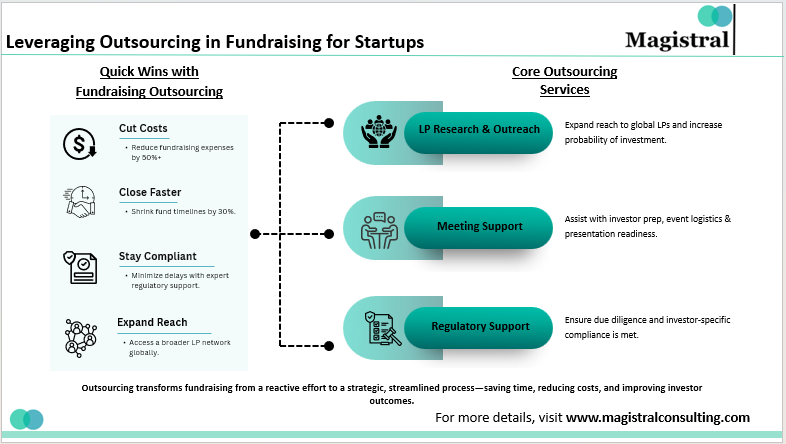Fundraising for startups represents a unique challenge and opportunity in today’s constantly shifting business landscape. With competition growing and investors becoming more sophisticated in their expectations, founders need to implement better strategies to meet capital requirements that unlock the growth stages of the company. In 2025, global venture capital funding has grown to unprecedented levels in some prominent markets, but the deal volumes are shrinking even as capital inflow into the sector has increased overall. Investor interests are narrowing as priority is given to successful quality business models over quantity. In this article, we examine the best ideas for fundraising for startups, demonstrate the benefits of operational outsourcing, and provide real industry knowledge.
Fundraising for Startups: The Evolving Landscape
There is no question that fundraising for startups has become increasingly more complex and competitive. Investors today are significantly more selective than they have been in recent years.

Fundraising for Startups: The Evolving Landscape in 2025
Key Market Trends
Investors want more transparency, strong unit economics, and a clear path to being profitable. Startups in fintech, AI, and health tech are accumulating most of the new funding. The average length of fundraising cycles has lengthened. Founders are pitching to more investors before completing each funding round. Outsourcing part of the fundraising process for startups is beginning to catch on to improve efficiency and results.
Data-Driven Insights
Venture capital funding exceeded 24 billion USD in the US in early 2025, representing a 50% increase from the previous year, even with fewer deals.
India’s tech startups raised USD 4.8 billion in H1 2025, ranking them third globally, with a 25% decline year-on-year.
Almost 25% of the fundraising rounds in Q1 2024 were down rounds, showing that the investor community is still interested in helping founders who are building strong fundamentals.
Investor Priorities and Market Shifts
Currently, investors expect startups to deliver data-driven stories about their business, along with a clear pathway to profitability. AI-enabled due diligence has become an established practice and has placed the onus on startups to provide more transparency, as well as quantitative metrics. The transition of funding from credit to equity has global implications, making the environment more competitive for early-stage companies.
Fundraising for Startups: Strategies for Success
To effectively fundraise for startups, you need preparation, flexibility, and targeted outreach. Startups that succeed are those that follow the playbook for investor engagement and market realities.
Laying the Foundation
Startups with product-market fit, early revenue, and an exceptional team will always catch an investor’s eye. Show traction early and demonstrate growth prospects.
Preparing Documentation
Professional pitch decks, financial models, and one-pager documents or factsheets are a “must”. Magistral Consulting has experience in all these areas and can help you produce documentation you can be proud of, that meets international standards and is meaningful to investors.
Market and Investor Research
Research into the size of your market, your competitors, and your investors’ interests allows you to position yourself appropriately. If you know your audience, you can be more targeted in your outreach.
Building Relationships
Making contact early on with potential investors and mentors can lead to introductions and help. Relationships run deep in the investment community. Putting effort into relationship building with investors will pay off during funding rounds when you are asking for money.
Operational Readiness
Startups should organize relevant legal, financial, and operational structure documentation before they start approaching investors for support. This would lend credibility and aid the due diligence process.
Diversifying Funding Sources
Combining traditional and innovative funding methods can provide resilience and flexibility.
Angel Investors and Venture Capital
Focusing on investors with direct experience in your sector will improve your odds of success. These investors usually come with capital and have valuable industry insights.
Crowdfunding and Revenue-Based Financing
Flexibility and less dilution are the most appealing aspects of these alternative funding models. Crowdfunding platforms and revenue-based funding provide mechanisms for capital without the loss of ownership or a huge equity stake.
Strategic Partnerships
Working with established companies can bring both capital and access to the market. Other contributions can include distribution and operational functions.
Leveraging Outsourcing in Fundraising for Startups
If a startup can outsource parts of the fundraising process, we can improve speed and overall results for the startup. Throughout this process, Magistral Consulting has handled fundraising for startups and for funds from the very beginning – documentation through investor outreach.

Leveraging Outsourcing in Fundraising for Startups
LP Research and Outreach
Magistral profiles and reaches out to Limited Partners (LPs) worldwide for our clients and expands the number of potential investors. This systematic and intentional approach enhances the probability of gaining investment from LPs.
Meeting & Event Support
When joining the fundraising process, we also helped with the unsexy items, such as preparing for meetings with investors and industry conferences. This full cycle support undoubtedly increases preparedness for founders and increases the chances of making a positive impression on a potential LP investor. There are multiple items we help with, including logistics, presentation preparation, and overall follow-up.
Costs and Efficiency Benefits
Outsourcing parts of the fundraising journey can lead to cost savings upwards of 50%, as well as a reduction in overall fund-close timelines of upwards of 30%1. This means startups can use their time savings to devote more resources to product development and expanding the market for their services.
Regulatory and Compliance Guidance
There are lots of regulatory and compliance aspects to consider while fundraising. Thankfully, the specialists we find help manage these regulatory challenges, and due diligence steps reduce each startup’s risk. In addition, compliance support can ensure that the potential startup has met the requirements of the potential investor. This can prevent delays and costs associated with not being compliant.
Trends Shaping Fundraising for Startups in 2025
Founders must adapt to emerging trends to remain competitive. The rules of the fundraising game are evolving due to new technologies, investor behaviors, and shifts in worldwide markets.
AI and Digital Transformation
Artificial Intelligence is redefining due diligence and deal sourcing while making data-driven storytelling a must. AI tools can help founders analyze market trends and better understand the wants, needs, and behaviors of investors.
Rise of Micro-VCs and Syndicates
Smaller funds are investing in niche markets and pre-stage companies while providing guidance AND capital. Micro-VCs are also typically nimbler and can act on an investment decision quicker than other funds.
Global Shifts in Funding
While the US dominates the venture capital landscape, India and Japan are still managing to weather the storm. China, however, has seen double-digit downturns in both deal volume and deal value, which may highlight some of the shifted patterns in global funding.
Sector Focus
Startup companies in sectors like AI, fintech, and Health tech are raising larger rounds of funding that indicate the interests of investors who are hungry to support innovation. In these sectors, startup companies should be promoting their technological advantages and scalability.
Outsourcing as a Strategic Advantage
While founders use outsourcing to enhance fundraising, they also gain access to tailored expertise, scalable solutions, and global investor networks. This allows founders to concentrate on business growth.
About Magistral Consulting
Magistral Consulting has helped multiple funds and companies in outsourcing operations activities. It has service offerings for Private Equity, Venture Capital, Family Offices, Investment Banks, Asset Managers, Hedge Funds, Financial Consultants, Real Estate, REITs, RE funds, Corporates, and Portfolio companies. Its functional expertise is around Deal origination, Deal Execution, Due Diligence, Financial Modelling, Portfolio Management, and Equity Research
For setting up an appointment with a Magistral representative visit www.magistralconsulting.com/contact
About the Author
The article is authored by the Marketing Department of Magistral Consulting. For any business inquiries, you can reach out to prabhash.choudhary@magistralconsulting.com
How do startups stand out to investors in the year 2025?
By demonstrating strong fundamentals, following trends in the industry, and presenting a compelling and data-driven narrative, startups can really make a difference in a very competitive market.
Is outsourcing fundraising activities effective for startups?
Yes, outsourcing provides access to specialized expertise, reduces costs, and accelerates the fundraising process, allowing founders to focus on growth.
What are the current trends in fundraising for startups?
Key trends include AI-driven due diligence, growth of micro-VCs, increased selectivity among investors, and a focus on sectors like AI and fintech.
How long does fundraising for startups take?
The process varies, but recent data shows that founders often pitch to 10–50 investors before closing a round, with cycles taking longer than in previous years.